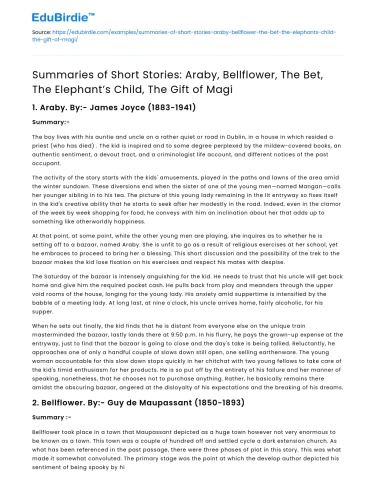Introduction
Short stories offer a unique lens through which readers can explore complex human experiences and emotions within a compact framework. Renowned for their brevity and depth, stories such as "Araby" by James Joyce, "Bellflower" by Guy de Maupassant, and "The Bet" by Anton Chekhov delve into themes of desire, disillusionment, and moral introspection. These narratives not only entertain but also provoke thought and introspection, inviting readers to consider profound questions about life, love, and ethics. This essay aims to summarize these iconic short stories, highlighting their thematic concerns and narrative techniques. Through examining the protagonists' journeys and the authors' stylistic choices, we gain insights into the universal aspects of the human condition. By analyzing these stories, we also explore how they reflect and challenge societal norms, thereby enhancing our understanding of both literature and life.
Exploration of Desire and Disillusionment in "Araby"
James Joyce's "Araby" is a poignant exploration of youthful infatuation and the subsequent disillusionment that often accompanies it. The story is set in Dublin, a city that symbolizes the constraints and monotony of early 20th-century life. The protagonist, a young boy, becomes enamored with his friend's sister, viewing her as an embodiment of all his romantic ideals. He dreams of buying her a gift from the exotic Araby bazaar, a symbol of his adolescent fantasies and aspirations. Joyce employs a first-person narrative to immerse readers in the boy's introspective world, using rich imagery and symbolism to convey the intensity of his emotions. For example, the bazaar represents the allure of the unknown and the boy's longing for a more exciting existence.
Save your time!
We can take care of your essay
- Proper editing and formatting
- Free revision, title page, and bibliography
- Flexible prices and money-back guarantee
However, the story culminates in a moment of stark realization at the bazaar, where the boy confronts the harsh realities of life. The bazaar is not the magical place he imagined but a mundane, commercialized environment. This realization shatters his illusions, leaving him with a sense of emptiness and self-awareness. As critic Harry Stone notes, "Joyce captures the universal experience of awakening from innocent dreams to the sobering truths of reality" (Stone, 1979). This theme of disillusionment is central to the story, illustrating the gap between dreams and reality that is a quintessential aspect of the human experience.
Moral Introspection in "The Bet" and Societal Reflection in "Bellflower"
Anton Chekhov's "The Bet" is a compelling narrative that examines the value of human life and the moral implications of wealth and knowledge. The story revolves around a banker and a lawyer who engage in a bet about whether solitary confinement is preferable to the death penalty. The lawyer agrees to live in isolation for fifteen years in exchange for a large sum of money. Chekhov uses this premise to delve into themes of existentialism and the pursuit of knowledge. The lawyer immerses himself in books, exploring a wide range of disciplines during his confinement. However, as the years pass, he becomes disillusioned with material wealth, ultimately renouncing the money moments before winning the bet.
Chekhov's narrative underscores the futility of materialism and the profound impact of self-discovery. As the lawyer states, "I despise freedom and life and health, and all that your books call the good things of the world" (Chekhov, 1889). The story invites readers to reflect on their own values and the true meaning of fulfillment. In contrast, Guy de Maupassant's "Bellflower" offers a reflection on societal norms and human behavior. It tells the story of a man who grows obsessed with the bellflower that symbolizes his lost youth and missed opportunities. Maupassant uses this narrative to critique the societal pressures that lead individuals to prioritize superficial achievements over genuine happiness.
Conclusion
In summary, the short stories "Araby," "The Bet," and "Bellflower" offer profound insights into the complexities of human emotions and societal constructs. Through their narrative techniques and thematic explorations, these stories invite readers to engage with questions of desire, morality, and societal expectations. By capturing the essence of disillusionment, introspection, and societal critique, these narratives resonate with universal human experiences, encouraging readers to reflect on their own lives and values. As we delve into these stories, we are reminded of literature's power to illuminate the intricacies of the human condition, transcending time and place to offer timeless insights. The enduring relevance of these short stories lies in their ability to provoke thought and inspire introspection, reinforcing the significance of literature as a mirror to our world.






 Stuck on your essay?
Stuck on your essay?

